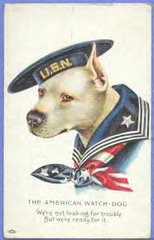But today, many see the pit bull as something very different: As either the center of a rural, Southern white tradition of animal baiting, or the vicious devil dog snarling on the covers of rap CDs or mauling other dogs for big-time purses, as in the recent indictment of NFL star Michael Vick.
"It's important to understand that this isn't about race, but it is about culture," said Cindy Cooke of the United Kennel Club. "One is rural, and the other is urban. But both are equally horrible."
The American pit bull was developed in the late 19th century by British breeders crossing bulldogs with terriers. They were "looking for a dog that combined the gameness of the terrier with the strength and athleticism of the Bulldog," the kennel club says.
But to a dogfighter, "gameness" is code for a dog's ability to keep struggling, even as its body goes into shock from blood loss.
'Tied into the hip hop culture'
The breed's image remained largely positive until the late 1970s, when some widely publicized attacks on children started to turn the public's perception, says Karen Delise, a veterinary technician who has studied fatal dog attacks for 15 years and is the author of the book "The Pit Bull Placebo: The Media, Myths and Politics of Canine Aggression."
Every generation has had its guard dogs — the German shepherd, the Rottweiler and others over the years, she says. She blames the music industry — in concert with the media and the Internet — for making the pit bull the devil dog du jour.
"It's all tied into the hip hop culture, the image and projection of a dog as an extension of your manhood," she says. "The pit bull is the ultimate accessory."
It's not just white people like Delise saying that.
"Hip-hop culture put Vick in this bind," declared the headline on a recent column in The Kansas City Star. Staff columnist Jason Whitlock, who is black, said he hoped Vick's troubles would "serve as yet another wakeup call for black athletes to reject the hip-hop/prison culture that glorifies much of the negative behavior and attitude that has eroded the once-dignified and positive reputation of black athletes."
Gerald Early, a professor of English and African-American studies at Washington University in St. Louis, thinks there is some truth to the argument that rap and hip hop music have helped make the pit bull the "tough dog of the day."
Early, who is black and has written extensively on athletics in black culture, says football is a macho sport dominated by black men, many of them raised on rap and "fired up by the sort of romantic image of being a gangster." Some arrests of players has brought an NFL crackdown effort.
'Hideous crimes'
The Humane Society of the United States points to CDs such as DMX's "Grand Champ" — code in the dogfighting world for an animal that's won five straight contests — or to the video for Jay-Z's "99 Problems," which features a pit bull lunging at the camera.
But rap impresario Russell Simmons, founder of Def Jam Records and manager of such acts as Run-D.M.C., Public Enemy and the Beastie Boys, says those images are just reflections of what is happening on our streets.
"That's the reality," he told the AP in a telephone interview. "That's why we have poets, have always had poets and artists in society, to say things that sometimes people don't say otherwise."
Simmons co-signed a letter last week with the Rev. Al Sharpton and others denouncing "these hideous crimes" and calling on the sporting world to join the fight.
Simmons says the Vick case "is a blessing in the fact that he's brought this to light, that this is happening in our society." The question now is "how we handle it now that it's on the front page."
30th most popular breed
Caught in the middle of this whole thing is the breed itself.
Cooke says research has disproved common myths about the pit bull, such as the one about its bite force being greater than that of other breeds. "It can't really be the T-rex in a dog suit that it's portrayed as in the media," she says, noting it's Americans' 30th most popular breed, ahead of even Dalmatians and collies.
But the breed's image problem is not helped when Web sites such as www.gamedogs.org carry links to kennels with names like Hellz Comin' and Death Before Dishonor. Many breeders take great pains to distance themselves from the blood sport.
"No pup will be sold for illegal or cruel purposes," declares the Web site of Pitfall Kennels, the Atlanta breeding operation started by Antwan "Big Boi" Patton, a founding member of the hip hop group OutKast. His site boasts tennis star Serena Williams, and musicians 50 Cent and Usher among Pitfall's clients.
'Serves their purpose'
Authorities say North Carolina has become something of a center for pit bull breeding and fighting. According to the indictment, several of Vick's dogs came from North Carolina.
Tom Garner, who lives outside of Raleigh, is a leading breeder. A 1985 dogfighting conviction, he says, was the result of being in the wrong place at the wrong time.
In an e-mail response to the AP, Garner said he would not knowingly sell to someone who wanted to fight one of these "magic animals." But dogs are out of his control once they leave his yard.
"I am aware that some dogs from my bloodline are fought," he wrote. "This is analogous to criminals using Toyotas for getaway cars because of their reliability. Certainly Toyota doesn't set out to build getaway cars, but nevertheless the criminal will often find a way to get the item that serves their purpose."









No comments:
Post a Comment